Abarth 500 595 695 vs VW ID. Buzz Cargo – Which car suits you better?
Both models have their strengths – but which one suits you more?
Compare performance, efficiency, price and space directly: Abarth 500 595 695 or VW ID. Buzz Cargo?
Costs and Efficiency:
Price and efficiency are key factors when choosing a car – and this is often where the real differences emerge.
Abarth 500 595 695 has a noticeable advantage in terms of price – it starts at 32600 £, while the VW ID. Buzz Cargo costs 43600 £. That’s a price difference of around 11002 £.
In terms of energy consumption, the advantage goes to the Abarth 500 595 695: with 17.10 kWh per 100 km, it’s to a small extent more efficient than the VW ID. Buzz Cargo with 19.20 kWh. That’s a difference of about 2.10 kWh.
As for range, the VW ID. Buzz Cargo performs convincingly better – achieving up to 455 km, about 190 km more than the Abarth 500 595 695.
Engine and Performance:
Power, torque and acceleration are the classic benchmarks for car enthusiasts – and here, some clear differences start to show.
When it comes to engine power, the VW ID. Buzz Cargo has a significantly edge – offering 340 HP compared to 155 HP. That’s roughly 185 HP more horsepower.
In terms of top speed, the VW ID. Buzz Cargo performs barely noticeable better – reaching 160 km/h, while the Abarth 500 595 695 tops out at 155 km/h. The difference is around 5 km/h.
There’s also a difference in torque: VW ID. Buzz Cargo pulls clearly stronger with 679 Nm compared to 235 Nm. That’s about 444 Nm difference.
Space and Everyday Use:
Beyond pure performance, interior space and usability matter most in daily life. This is where you see which car is more practical and versatile.
Seats: Abarth 500 595 695 offers clearly perceptible more seating capacity – 4 vs 3.
In curb weight, Abarth 500 595 695 is decisively lighter – 1410 kg compared to 2264 kg. The difference is around 854 kg.
In maximum load capacity, the VW ID. Buzz Cargo performs clearly better – up to 3900 L, which is about 3350 L more than the Abarth 500 595 695.
When it comes to payload, VW ID. Buzz Cargo significantly takes the win – 753 kg compared to 385 kg. That’s a difference of about 368 kg.
Who wins the race?
The VW ID. Buzz Cargo proves to be leaves the rival little chance and therefore becomes our DriveDuel Champion!
VW ID. Buzz Cargo is the better all-rounder in this comparison.
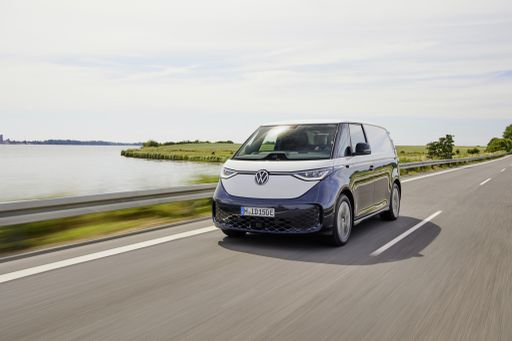 @ Volkswagen AG / VW Media
@ Volkswagen AG / VW Media
VW ID. Buzz Cargo
Abarth 500 595 695
The Abarth 500, particularly in its 595 and 695 renditions, captures the spirit of Italian motoring with its compact yet aggressive design. Known for its lively performance and distinctive styling, this little powerhouse is a joy to drive, offering an engaging experience that appeals to enthusiasts. With its rich motorsport heritage, the Abarth 500 embodies the essence of fun and excitement on both the streets and the race track.
details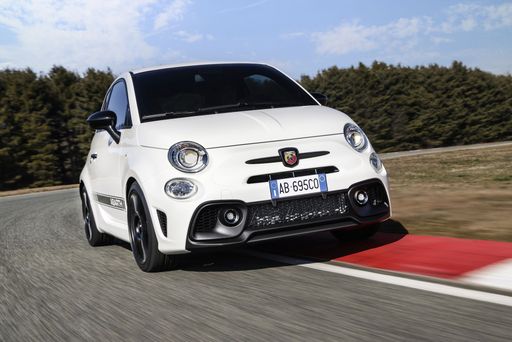 @ Abarth / Stellantis Media
@ Abarth / Stellantis Media
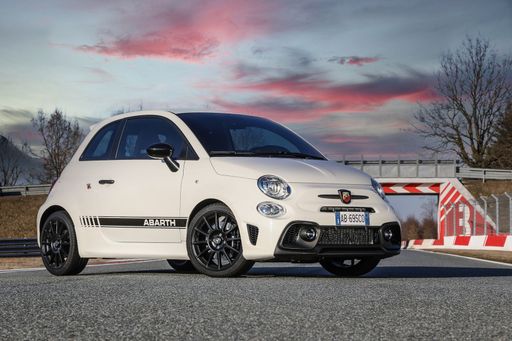 @ Abarth / Stellantis Media
@ Abarth / Stellantis Media
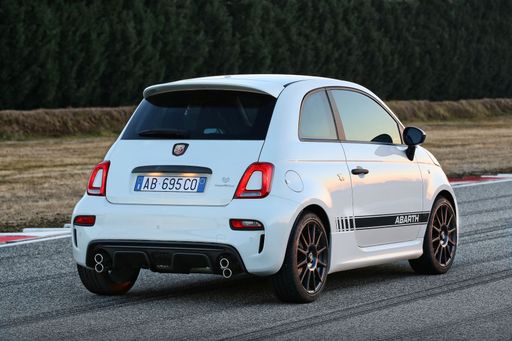 @ Abarth / Stellantis Media
@ Abarth / Stellantis Media
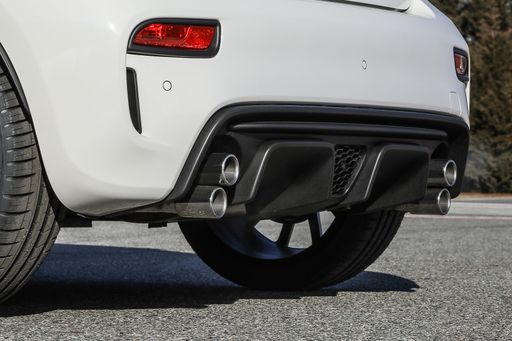 @ Abarth / Stellantis Media
@ Abarth / Stellantis Media
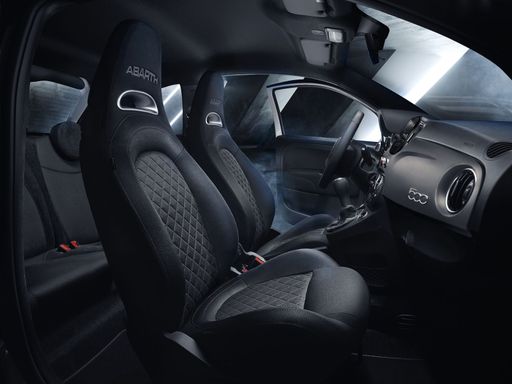 @ Abarth / Stellantis Media
@ Abarth / Stellantis Media
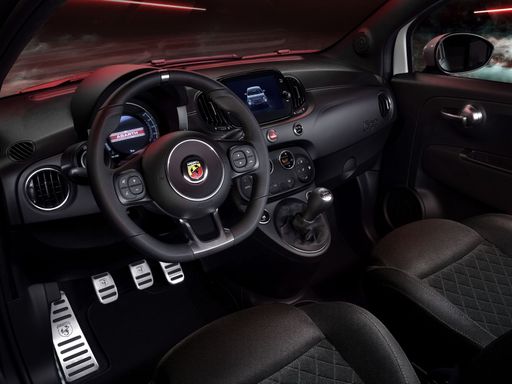 @ Abarth / Stellantis Media
@ Abarth / Stellantis Media
VW ID. Buzz Cargo
The VW ID. Buzz Transporter represents a bold leap into the future with its innovative electric design and retro-inspired aesthetic. Combining practicality with modern technology, it offers a spacious interior and advanced connectivity features ideal for both urban and long-distance journeys. This vehicle stands as a testament to Volkswagen's commitment to sustainability and forward-thinking mobility solutions.
details @ Volkswagen AG / VW Media
@ Volkswagen AG / VW Media
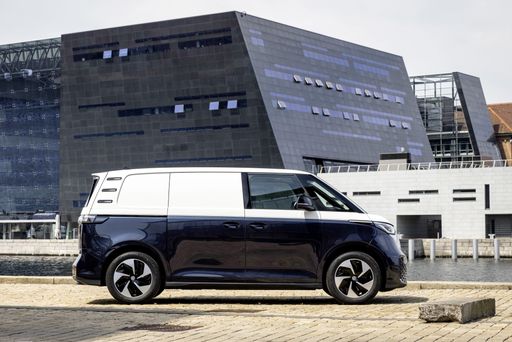 @ Volkswagen AG / VW Media
@ Volkswagen AG / VW Media
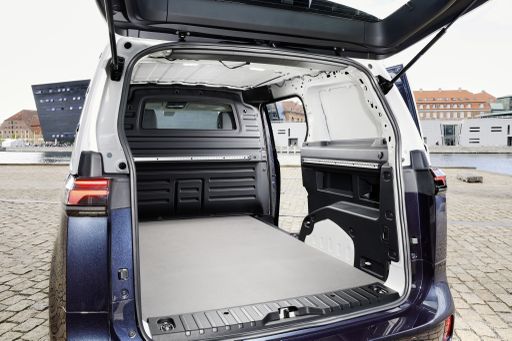 @ Volkswagen AG / VW Media
@ Volkswagen AG / VW Media
 @ Abarth / Stellantis Media
@ Abarth / Stellantis Media
|
 @ Volkswagen AG / VW Media
@ Volkswagen AG / VW Media
|
|
|
|
Costs and Consumption |
|
|---|---|
|
Price
32600 - 39400 £
|
Price
43600 - 51400 £
|
|
Consumption L/100km
-
|
Consumption L/100km
-
|
|
Consumption kWh/100km
17.1 - 18.8 kWh
|
Consumption kWh/100km
19.2 - 20.3 kWh
|
|
Electric Range
242 - 265 km
|
Electric Range
330 - 455 km
|
|
Battery Capacity
37.80 kWh
|
Battery Capacity
59 - 79 kWh
|
|
co2
0 g/km
|
co2
0 g/km
|
|
Fuel tank capacity
-
|
Fuel tank capacity
-
|
Dimensions and Body |
|
|---|---|
|
Body Type
Hatchback
|
Body Type
Cargo Van
|
|
Seats
4
|
Seats
3
|
|
Doors
3
|
Doors
4
|
|
Curb weight
1410 - 1435 kg
|
Curb weight
2264 - 2510 kg
|
|
Trunk capacity
185 L
|
Trunk capacity
-
|
|
Length
3673 mm
|
Length
4712 mm
|
|
Width
1682 mm
|
Width
1985 mm
|
|
Height
1518 mm
|
Height
1932 mm
|
|
Max trunk capacity
550 L
|
Max trunk capacity
3900 L
|
|
Payload
370 - 385 kg
|
Payload
640 - 753 kg
|
Engine and Performance |
|
|---|---|
|
Engine Type
Electric
|
Engine Type
Electric
|
|
Transmission
Automatic
|
Transmission
Automatic
|
|
Transmission Detail
-
|
Transmission Detail
-
|
|
Drive Type
Front-Wheel Drive
|
Drive Type
Rear-Wheel Drive, All-Wheel Drive
|
|
Power HP
155 HP
|
Power HP
170 - 340 HP
|
|
Acceleration 0-100km/h
7 s
|
Acceleration 0-100km/h
-
|
|
Max Speed
155 km/h
|
Max Speed
145 - 160 km/h
|
|
Torque
235 Nm
|
Torque
310 - 679 Nm
|
|
Number of Cylinders
-
|
Number of Cylinders
-
|
|
Power kW
114 kW
|
Power kW
125 - 250 kW
|
|
Engine capacity
-
|
Engine capacity
-
|
General |
|
|---|---|
|
Model Year
2023
|
Model Year
2024
|
|
CO2 Efficiency Class
A
|
CO2 Efficiency Class
A
|
|
Brand
Abarth
|
Brand
VW
|
Is the Abarth 500 595 695 offered with different drivetrains?
The Abarth 500 595 695 is offered with Front-Wheel Drive.
The prices and data displayed are estimates based on German list prices and may vary by country. This information is not legally binding.
